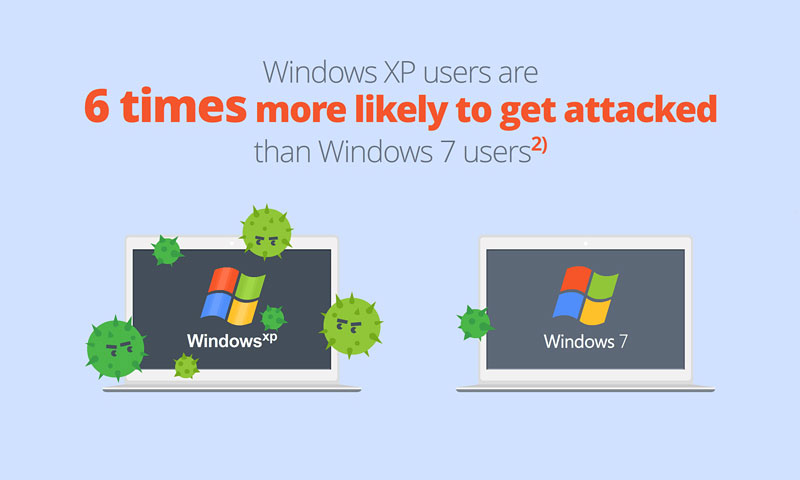
Anti-Malware Providers Aren’t Jumping Ship From Windows XP
With Microsoft about to end support of its dated Windows XP platform, the big question for users is this: Can we still use antivirus tools? The answer is yes, but it's probably still better to upgrade, antivirus companies say.
Microsoft may be leaving Windows XP behind, but antivirus companies are sticking around, at least for a little while.
And they have some harsh words for the tech giant.
“The abandonment by Microsoft will not only affect Windows XP users, but will create a big security problem for the whole ecosystem,” Ondrej Vlcek, chief operations officer of the anti-malware company Avast, wrote last week. “Tens of millions of PCs running XP connected to the internet, unpatched and without security updates, are just waiting to be exploited.”
Ouch.
With 23.6 percent of Avast’s 211 million users still on Windows XP, that’s clearly a problem, especially since—even before the current situation—XP-based computers were six times more likely than Windows 7 computers to get attacked.
A quick roundup of anti-malware software provider transition plans:
Avast: The company has pledged to continue offering support to Windows XP users for the next three years and will create additional security modules and detection capabilities. It also plans on doing one other thing. “In addition to the security value, avast! 2014 is offered for free, which is especially important for XP users,” Vlcek wrote. “Upgrading to a newer version of Windows comes with costs, costs that not everyone can afford and is probably a big reason why many users haven’t upgraded yet.”
Malwarebytes Anti-Malware: This antivirus provider, which puts its XP-based install base at 20 percent, says it has no plans to leave the base behind. “Corporate users can’t just upgrade, they may have legacy software running on XP and don’t [want] to spend millions on updating,” Malwarebytes founder and CEO Marcin Kleczynski told BetaNews. The company, with a current install base of around 200 million users, announced the plan at the same time it announced a new premium product Monday at a price of $24.95 per year for up to three computers. It also offers enterprise options.
Kapersky: The security company is sticking around on XP, at least for now. “Current versions of our consumer products and at least two next generations will be installed and correctly function on the XP platform,” the company said in a blog post in January.
Symantec: Unlike some of their competitors, the owners of the Norton brand aren’t nearly as committed to staying around for long, telling USA Today they would likely support the platform for only one more year. The company’s Gerry Egan highly recommends that users upgrade. “We can run interference and we’ll block lots, and maybe most of, attacks. But we just want our customers to understand that the real fix is to fix the door,” he said.
McAfee: The Intel-owned security company (which is no longer affiliated with its maverick founder and will soon change its name) took a similar stance to Symantec’s, saying that while it plans to offer support for one more year, there’s only so much it can do about XP. The company added that while its antivirus software “does not inherently stop vulnerabilities, it does make exploitation of those vulnerabilities significantly more difficult, if not impossible.”
Microsoft isn’t completely giving up on XP users yet: The company’s own anti-malware program, Microsoft Security Essentials, will support XP until July 2015. But the operating system won’t get the security updates of newer versions.
As Egan noted to USA Today, that could be a big headache down the road.
“Imagine you’re a bad guy. Think of it as a monthly newsletter, it’s almost like a list of broken windows sent to you,” he said.
(Avast infographic)






Comments